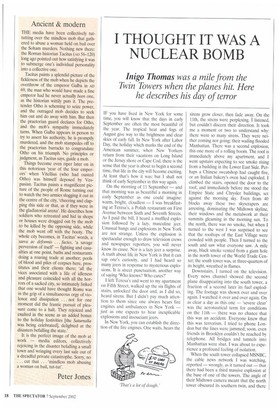Ancient & modern
THE media have been collectively tuttutting over the mindless mob that gathered to abuse a woman held on bail over the Soham murders. Nothing new there: the Roman historian Tacitus (Al) 56-120) long ago pointed out how satisfying it was to submerge one's individual personality into a collective one.
Tacitus paints a splendid picture of the fickleness of the mob when he depicts the overthrow of the emperor Galba in Al) 69, the man who would have made a fine emperor had he never actually been one, as the historian wittily puts it. The pretender Otho is scheming to seize power, and the outraged mob decides to seek him out and do away with him. But then the praetorian guard declares for Otho, and the mob's sympathy immediately turns. When Galba appears in person to try to assert his authority, he is promptly murdered, and the mob stampedes off to the praetorian barracks to congratulate Otho on his triumph. No principles or judgment, as Tacitus says, guide a mob.
Things become even riper later on in this notorious 'year of the four emperors' when Vitellius (who had ousted Otho) was himself deposed by Vespasian. Tacitus paints a magnificent picture of the people of Rome turning out to watch the two armies slogging it out in the centre of the city, 'cheering and clapping this side or that, as if they were in the gladiatorial arena'. He describes how soldiers who retreated and hid in shops or houses were dragged out by the mob to be killed by the opposing side, while the mob went off with the booty. The whole city becomes, in Tacitus' words, a
saeva ac defonnis fades, 'a savage perversion of itself — fighting and casualties at one point, baths and restaurants doing a roaring trade at another; pools of blood and piles of corpses here, prostitutes and their clients there; 'all the vices associated with a life of idleness and pleasure coincided with all the horrors of a sacked city, so intimately linked that one would have thought Rome was in the grip of a simultaneous orgy of violence and dissipation . . . not for one moment did the frantic pursuit of pleasure come to a halt. They rejoiced and exulted in the scene as an added bonus to the holiday festivities [the Saturnalia was being celebrated], delighted at the disasters befalling the state.'
It is the perfect image of the mob at work — media editors, collectively rejoicing in the disaster befalling a small town and wringing every last sale out of a dreadful private catastrophe. Sony, no . . . cut that . . . 'mindless mob abusing a woman on bail, tut-tut'.
Peter Jones


























































 Previous page
Previous page